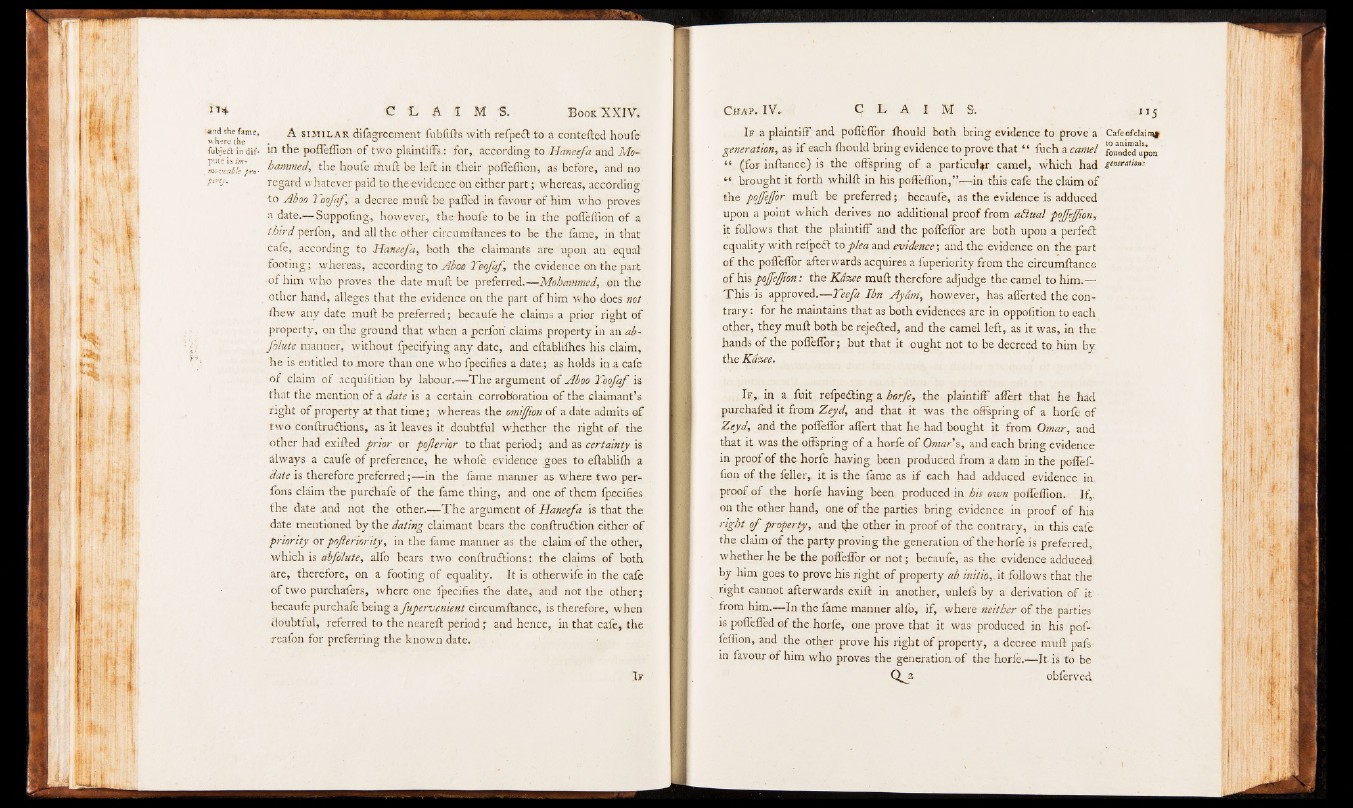
iSSlfi.
9 i i
114 C L A 1 M S. B o o k XX IV ,
■ and the fame, A SIMILAR difagreement fubfifts with refpect to a contefted houfe
fubjeaindif- in the poffeffion of two plaintiffs,: for, according to Haneefa and Mo~
to-W?pn- bammed, the houfe rhuft be left in -their poffeffion, as before, and no
fcrtj. regard whatever paid to theevidence bn either part; whereas, according
to Aboo Yoofzf, a decree muft be paffed in favour o f him who proves
a date.— Suppofing, however, the houfe to be in the poffeffion of -a
third perfon, and all the other circumftances to be the fame, in that
cafe, according to Haneefa, both the claimants are upon an equal
footing; .whereas, according to Aboo Toofqf, thé evidence on the part
of him who proves the date muff be preferred.— Mohammed, on the
other hand, alleges that the evidence on the part of him who does not
fhew any date muft.be preferred ; becaufe he claims a prior right of
property, on the .ground that when a period .claims property in an ab-
fdlnte manner, without Specifying any date, and eftablifhes his claim,
he is entitled to more than one who fpecifies a date.; as holds in .a cafe
of claim of acquilition by labour.— The argument of Aboo Toofqf is
that the mention of a date is a certain corroboration of the claimant’s
right of property at that time; whereas the omijfon of a date admits of
two conftr.uftions, as it leaves it doubtful whether the right of the
other had exifted .prior or pofterior to that period; and as certainty is
always a caufe of preference, he whofe evidence goes to eftablifh a
date is therefore preferred;— in the fame manner as where two per-
fons claim the purchafe of the fame thing, and one o f them fpecifies
the date and not the other.— T h e argument o f Haneefa is that the
date mentioned by the dating claimant bears the conftruftion either of
priority or pofteriarity, in the fame manner as the claim o f the other,
which is dbfolute, alfo bears two conftru&ions: the claims of both
are, therefore, on a footing of equality. It is otherwife in the cafe
of two purchafers, where one fpecifies the date, and not the other;
becaufe purchafe being a fupervenient circumftance, is therefore, when
doubtful, referred to the neareft period ; and hence, in that cafe, the
reafon for preferring the known date.
I f
C t fA P . IV. C L A I M 9. l l5
I f a plaintiff and pofi'eflor Ihould both bring evidence to prove a Cafe ofclaim#
generation, as i f each thould bring evidence to prove that “ fuch a camel founded uj
“ (for inftance), is the offspring of a particular camel, which had gmmiia:
“ brought it forth whilft in his pofleffion,”— In this cafe the claim of
the pojfejfor muft be preferred; becaufe, as the evidence is adduced
upon a point which derives no additional proof from ablual pojfeffon,
it follows that the plaintiff and the poffeffor are both upon a perfed
equality with reiped to plea and evidence-, and the evidence on the part
of the poffeffor afterwards acquires a fuperiority from the circumftance
of his pojfeffion: the Kdzee muft therefore adjudge the camel to him.—
This is approved.— Tee fa Ibn Ay dm, however, has aflerted the contrary
: for he maintains that as both evidences are in oppofition to each
other, they muft both be rejeded, and the camel left,, as it was, in the
hands of the poffeffor; but that it ought not to be decreed to him by.
the Kdzee,
I f , in a fuit refpeding a horfe, the plaintiff affert that he had
purchafed it from Zeyd, and that it was the offspring of a horfe of
Zeyd, and the poffeffor affert that he had bought it from Omar, and
that it was the offspring o f a horfe of Omar's, and each bring evidence
in proof of the horfe having been produced from a dam in the poffeffion
qf the feller, it is the fame as i f each Jiad adduced evidence in
proof of the horfe having been produced in his own poffeflion. I f,
on the other- hand, one of the parties bring evidence in proof of his
right o f property, and the other in proof of the contrary, in this cafe
the claim of the party proving the generation of thehorfe is preferred,
whether he be the pofl'ellbr or not; becaufe, as the evidence adduced:
by him goes to prove his right .of property ab initio,, it follows that the
right cannot afterwards exift in. another, unlefs by a derivation of it
from him.— In the fame manner alfo, if, where neither o i the parties
is poffeffed of the horfe, one prove that it was produced in his poffeffion,
and the other prove his right of property, a decree muft pafs-
in favour of him who proves the generation o f the horfe.-—It. is to be
B £ obferved
upon